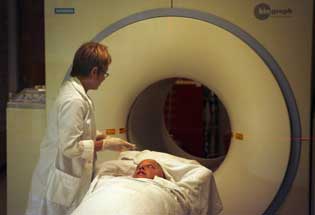PET Scan tracks cervical cancer

December 17, 2007
A machine invented at Washington University to reveal the inner workings of brains and hearts is emerging as a premier tool for tracking cervical cancer.
The device, called a positron emission tomography (PET) scanner, is similar to MRI scanners but uses radioactivity instead of X-rays to create images of blood flowing through organs, brain activity and other processes.
New research from the Siteman Cancer Center at Barnes-Jewish Hospital and Washington University show that PET scans are more accurate than any other method at predicting the aggressiveness of a cervical cancer tumor. The device also effectively shows whether treatments had destroyed the cancer.
Previously, doctors had no way to determine whether radiation or other therapies were working until a patient experienced symptoms or another tumor was found.
Advertisement
"The look on (patients') faces, the happiness and the joy when you tell them, 'It looks like you're going to do really well.' That's really powerful," said Dr. Julie K. Schwarz, a Barnes-Jewish Hospital resident in the Department of Radiation Oncology.
Schwarz was the lead author on one of the PET studies that was published last month in the Journal of the American Medical Association. Her research team studied women who had PET scans three months after completing radiation and chemotherapy between 2003 and 2006. The scans provided a more reliable measure of whether the cancer would recur, and, just as importantly, revealed whether the cancer was already beginning to return.
Each year, more than 10,000 women develop cervical cancer in the United States; about 3,900 die of the disease.
Kristy Monroe, 40, was lying on her back recently in Barnes-Jewish Hospital, swathed from chin to toe in white blankets. Red lasers painted stripes across her body and bald head as she passed through the large doughnut-shaped PET scanner. Monroe was diagnosed with cervical cancer in September, and nearly every day since, she has spent at Siteman Cancer Center being bombarded with radiation and dosed with chemotherapy.
Monroe also is part of a continuing study to determine whether PET scans can effectively monitor treatment. More >>
Labels: Cervical Cancer Research, Medical Advances

0 Comments:
Post a Comment
<< Home